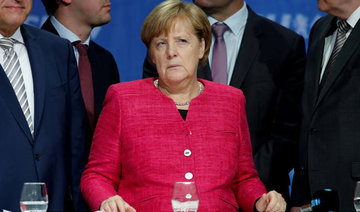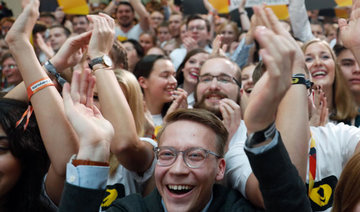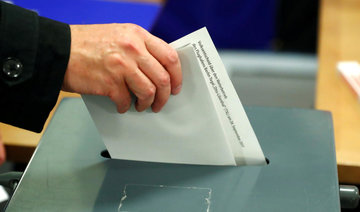BERLIN: Chancellor Angela Merkel will make a last push Sunday to forge a government, in a twin battle to save her political future and avert fresh elections that could destabilize Germany and Europe.
Elections in September had left the veteran leader weakened and without a majority as some of her party’s voters turned to the far-right AfD because of anger over her liberal refugee policy.
The disputed decision to let in more than a million asylum seekers since 2015 is also proving to be a stumbling block as she seeks an alliance with an unlikely group of parties spanning the left and right of the political spectrum.
Merkel’s conservative CDU party and its Bavarian allies the CSU, hoping to find common ground with the pro-business FDP and the Greens, have given themselves until Sunday to clinch a deal.
If they do not, Germany would have to hold new elections in 2018, as the center-left Social Democratic Party has ruled out returning to a coalition with Merkel after suffering a humiliating loss at September’s elections.
“Today is the last day of these exploratory talks. We must decide,” CSU chief Horst Seehofer said as he entered into talks Sunday.
Greens leader Cem Ozdemir also said that “so far we’ve been in extra time, but today it’s the penalty shoot-out.”
“Europe is anything but out of the crisis. Now it’s time to ask ourselves the question, Would France’s President Macron have to take the coal out of the fire because Germany is missing, or would Germany be capable of taking action?” Ozdemir added.
Merkel, who has years of gruelling EU negotiations under her belt, now needs to see through what is likely the most important weekend of her political life.
“Today is not only about (the coalition), but also a day of destiny for Angela Merkel. If she fails to forge a coalition, then her chancellorship is in danger,” the top-selling Bild newspaper said.
Frank Decker, a political scientist at the University of Bonn, also had no doubt about what is at stake.
“It is absolutely in her interest for this government to come into being, because failure would spell her end,” he told the Phoenix news channel.
A poll by Welt online found that 61.4 percent of those surveyed said a collapse of talks would mean an end to Merkel as chancellor. Only 31.5 percent thought otherwise.
Merkel, in power for 12 years, had initially set a Thursday deadline to decide if the motley crew of parties had found enough common ground to begin formal coalition negotiations.
But the talks went into overtime without a breakthrough.
Key among sticking points is the hot-button issue of immigration.
The CSU, which lost significant ground in Bavaria to the AfD and faces a crucial state election next year, wants to limit the number of future arrivals at 200,000 a year.
German media reports said the Greens were ready give way on the CSU’s demand, but in return, they insist that war refugees — who are granted only temporary protection — should be allowed to bring their family members to Germany.
“We will not accept that people who are already getting a lower status of protection by law are also excluded from family reunions. That is inhumane,” Greens negotiator Juergen Trittin told the Bild am Sonntag newspaper.
The Greens will be wary of making concessions ahead of a party congress in a week’s time, and rank-and-file members can still torpedo any deal that they deem unsatisfactory.
Germany’s President Frank-Walter Steinmeier played down the conflict, telling the Welt am Sonntag newspaper that if negotiators are “battling hard over major questions like migration and climate change, that may not be a bad thing for democracy.”
There is “no need to start holding panic debates about new elections,” he said.
He added that “all sides are aware of their responsibilities. And this responsibility means not returning their mandate to voters.”
If the potential tie-up, dubbed a “Jamaica coalition” because the parties’ colors match those of the Jamaican flag, comes together, it would be the first of its kind at the national level.
But questions abound about how stable it would be.
SPD parliamentary chief Andrea Nahles told the Funke media group she believed such an alliance would be “a coalition of mistrust, in which there is constant conflict, where each one plays his own cards, and where there isn’t teamwork.”
Decker, the political scientist, said he “wouldn’t place a bet on whether this government will hold together for four years.”
Merkel in final push for coalition to avert crisis
Merkel in final push for coalition to avert crisis

Singapore says 3 men detained since October for seeking to join Mideast conflict

The Home Affairs Ministry said in a statement the three Singaporean men were not linked to one other and had been “radicalized” online, but there was no indication others had been recruited.
It was not immediately clear why the ministry announced the detention on Thursday.
Following their arrest in October, they were detained under Singapore’s Internal Security Act, which allows suspects to be held for lengthy periods without trial.
The three were a director of a digital marketing company, a lift mechanic, and a security guard, aged 41, 21, and 44, respectively.
One of the men had visited a shooting range in Thailand to learn to operate firearms, while two planned to visit shooting ranges in Indonesia, it said.
The ministry said restrictions were placed on two other Singaporeans in June and July last year under the security law, related to the conflict in Gaza.
More than 46,000 people have been killed in the Gaza war, according to Palestinian health officials.
Much of the enclave has been laid waste, and most of the territory’s 2.1 million people have been displaced multiple times and face acute shortages of food and medicine, humanitarian
agencies say.
Zelensky meets Meloni for talks in Rome

- Meloni “reiterated the all-round support that Italy ensures and will continue to provide to the legitimate defense of Ukraine... ,” her office said
- She also “expressed solidarity for the victims of the recent Russian bombings“
ROME: Ukrainian President Volodymyr Zelensky held talks in Rome Thursday with Italian Prime Minister Giorgia Meloni, after meeting other allies in Germany.
Meloni “reiterated the all-round support that Italy ensures and will continue to provide to the legitimate defense of Ukraine... to put Kyiv in the best possible condition to build a just and lasting peace,” her office said.
She also “expressed solidarity for the victims of the recent Russian bombings,” it said in a statement, as the grinding war nears the three-year mark.
Zelensky had earlier Thursday joined a meeting of about 50 allies at the US air base Ramstein in Germany — the last such gathering before Trump takes office on January 20.
The US president-elect has criticized the large amount of US aid for Kyiv and vowed to bring the war to a swift end, without making any concrete proposals for a ceasefire or peace agreement.
In Germany, Zelensky said Trump’s return to the White House would open a “new chapter” and reiterated a call for Western allies to send troops to help “force Russia to peace.”
In a post on X, Zelensky thanked Italy for its “unwavering support,” saying: “Together, we can bring a just peace closer and strengthen our collective positions.”
He and Meloni discussed “strengthening security, addressing global developments, and preparing for this year’s Ukraine Recovery Conference to be held in Rome,” he said.
Meloni, who has led NATO and EU member Italy since October 2022, has strongly supported Ukraine in its fight against Russia, but is also politically close to Trump.
At a press conference in Rome earlier, Meloni — who visited Trump at his Florida home last weekend — said she did not believe the president-elect would abandon Kyiv.
“Frankly I don’t foresee a disengagement,” she said, adding that Trump had previously “said precisely because we want peace, we will not abandon Ukraine.”
She added that she would support options for peace that Ukraine would support.
NATO and EU member Italy has sent arms and aid to Ukraine to help fight off Russia’s invading forces, but has refused to allow Kyiv to use its weapons inside Russian territory.
Zelensky’s spokesman Sergiy Nykyforov said the Ukrainian president would meet Friday with Italian President Sergio Mattarella, the country’s largely ceremonial head of state.
US Secretary of State Antony Blinken was also in the Italian capital on Thursday for separate talks with European counterparts on Syria. It was not clear if he planned to meet Zelensky during his trip.
US President Joe Biden had also been due to visit Rome in what was expected to be his final overseas trip in office, but canceled to focus on the federal response to wildfires raging across Los Angeles.
Scotland leader refuses to be drawn on Lockerbie bombing inquiry

- John Swinney would not speculate on backing public inquiry into 1988 attack while criminal case against suspected bomb maker underway in US
- Bombing of Pan Am Flight 103 over UK that killed 270 people blamed on Libyan intelligence officials
LONDON: Scotland’s first minister has refused to be drawn on whether he supports a public inquiry into the 1988 bombing of a passenger plane blamed on Libyan intelligence officials.
The downing of Pan Am Flight 103 over the Scottish town of Lockerbie killed 270 people and remains by far the most deadly terror attack on British soil.
Libyan intelligence officer Abdel Baset Ali Al-Megrahi was jailed in 2001 for his role in the plot to place the bomb on board the flight. Al-Megrahi, who died in 2012, always insisted he was innocent and doubts have been raised about his conviction.
A television series released last week in the UK, which tells the story of the investigation by one of the victim’s fathers, has renewed interest in the case, as has an upcoming court case in the US of the alleged bomb maker, the Libyan Abu Agila Masud.
A member of the Scottish Parliament, Christine Grahame, asked First Minister John Swinney on Thursday if he supported a UK inquiry into the bombing given the “remaining concerns for some, including myself, about the credibility of the conviction” of Al-Megrahi.
She also highlighted what she described as the resistance of the UK Government to releasing relevant documents in relation to the bombing, the Daily Record reported.
Swinney said that while there was a criminal case underway in the US, “I would prefer not to speculate on possible inquiries.”
Al-Megrahi is the only person to have been convicted for the attack and there has been no public inquiry in the UK.
His trial by a Scottish court sitting in the Netherlands took place more than 11 years after the bombing and followed long negotiations with the then Libyan leader Muammar Qaddafi to hand him over along with another suspect.
The recent TV series “Lockerbie: A Search for Truth” stars British actor Colin Firth as Jim Swire, whose daughter was killed on the flight as it flew from London Heathrow to New York City four days before Christmas.
Swire believes that Al-Megrahi, who died in 2012 three years after being released on compassionate grounds, was innocent.
Two-thirds of the victims of the bombing were American and 11 residents in the town of Lockerbie were killed when sections of the aircraft fell on residential areas.
Russia breaches frontline river in east Ukraine, official says

- The Oskil river is the de-facto front line in parts of the eastern Kharkiv region
- The major of the local hub, Kupiansk, said the situation was “extremely difficult”
KYIV: Russian forces have established a bridgehead on the Ukrainian-held side of a frontline river in the east of the country, a local official said Thursday, pointing to Kyiv’s mounting battlefield struggles.
The Oskil river is the de-facto front line in parts of the eastern Kharkiv region, with Ukrainian troops entrenched mainly on the western bank and Russian forces moving to capture the eastern side.
Kremlin forces have been launching audacious attempts to cross, and local Ukrainian official Andrii Besedin told state television Thursday they had managed to cross and establish positions.
“The enemy is trying to gain a foothold in the town of Dvorichna, which is already on the right bank of the Oskil, and expand the entire bridgehead,” he said.
Besedin, the major of the local hub, Kupiansk, said the situation was “extremely difficult” and warned that Russian troops could use the bridgehead to flank Ukrainian positions.
He said Russian forces were now just two kilometers (about one mile) outside of Kupiansk, which was one of the main prizes of a Ukrainian counteroffensive in late 2022.
“The enemy is constantly trying to carry out assault operations,” he said.
The advances conceded by the local official come at a precarious time for Ukrainian forces across the sprawling front, where Russian forces have been advancing at their fastest pace in around two years.
If Russia captures more territory around Kupiansk or in the wider Kharkiv area it would undo gains that Ukraine secured in a sweeping 2022 offensive that embarrassed the Kremlin.
Both sides are looking to secure a better position on the battlefield before incoming US president Donald Trump’s January 20 inauguration, almost three years after Russia invaded.
Putin says more needs to be done to clean up Black Sea oil spill

- The oil leaked from two aging tankers after they were hit by a storm on Dec. 15 in the Kerch Strait
- One sank and the other ran aground
MOSCOW: Russian President Vladimir Putin said on Thursday that more needed to be done to clean up an oil spill in the Black Sea, saying efforts so far appeared to have been insufficient to deal with the ecological disaster.
The oil leaked from two aging tankers after they were hit by a storm on Dec. 15 in the Kerch Strait. One sank and the other ran aground.
Approximately 2,400 metric tons of oil products spilled into the sea, Russian investigators said last week, in what Putin on Thursday called “one of the most serious environmental challenges we have faced in years.”
When the disaster struck, state media reported that the stricken tankers, both more than 50-years old, were carrying some 9,200 metric tons (62,000 barrels) of oil products in total.
Since the spill, thousands of emergency workers and volunteers have been working to clear tons of contaminated sand and earth on either side of the Kerch Strait. Environmental groups have reported deaths of dolphins, porpoises and sea birds.
The Kerch Strait runs between the Black Sea and the Sea of Azov and separates Crimea’s Kerch Peninsula from Russia’s Krasnodar region.
Putin told a government meeting that the clean-up efforts had been poorly coordinated between regional and federal bodies.
“From what I see and from the information I receive, I conclude that everything being done to minimize the damage is clearly not enough yet,” the Kremlin leader told officials.
He called for a commission to be formed to mitigate the disaster and prevent oil products from leaking from flooded tankers in the future.




















